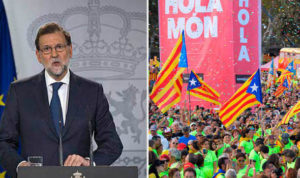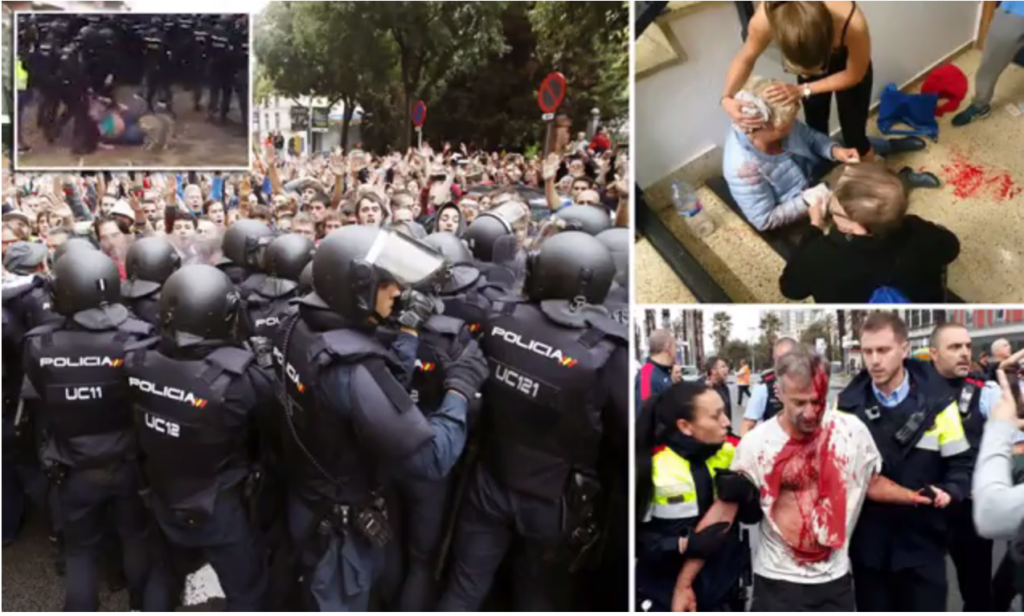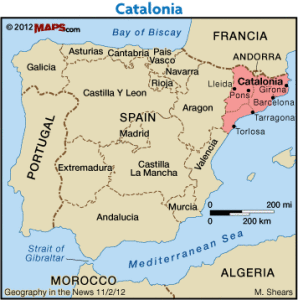Catalonia held an independence referendum yesterday. But only the Einsteinian definition of “insanity” explains why.
It’s bad enough that legal prohibitions and political machinations rendered it invalid. But this referendum followed similar referendums in 2009 and 2011, mass independence rallies in 2010 and 2012, a parliamentary declaration of sovereignty in 2013, a self-determination referendum in 2014, and a referendum masquerading as regional elections in 2015. Catalonia held them all to no avail.
 Yet came Sunday – complete with the Spanish government daring Catalonia to hold another referendum. Except that this aped the feckless spectacle of the US government daring North Korea to launch another missile.
Yet came Sunday – complete with the Spanish government daring Catalonia to hold another referendum. Except that this aped the feckless spectacle of the US government daring North Korea to launch another missile.
‘It won’t happen,’ insists Spain’s prime minister, and for the Catalan leaders trying to organise Sunday’s vote on seceding from Spain, his words are becoming harder and harder to contradict.
The nerve centre of the 1 October referendum – Catalonia’s economy department – has been seriously damaged by raids carried out by Spain’s military police force, the Civil Guard.
Fourteen junior officials and associates were arrested, but more importantly close to 10 million ballot papers were impounded, and websites informing Catalans about the election have been shut down.
(BBC, September 27, 2017)
Nevertheless, Catalonia persisted.

Catalan leader Carles Puigdemont says the region has won the right to statehood following Sunday’s contentious referendum which was marred by violence [leaving over 800 voters and dozens of police injured].
‘My government, in the next few days will send the results of today’s vote to the Catalan parliament, where the sovereignty of our people lies, so that it can act in accordance with the law of the referendum.’…
Earlier, as voting ended, Spanish Prime Minister Mariano Rajoy said Catalans had been fooled into taking part in an illegal vote, [calling] it a ‘mockery’ of democracy.
(BBC, October 1, 2017)
Mind you, even if Spain had allowed Catalonia to hold a free and fair independence referendum, most Catalans would probably have voted against it.
The silence of the majority, and its lengthy absence from the public arena, have created the illusion that ‘a majority of Catalans want independence.’ This illusion is shared by the secessionist minority and by observers outside Catalonia.
Yet survey after survey contradicts this view.
(El País, September 11, 2017)
Reports are that Catalonia’s silent majority boycotted this referendum – pursuant to exhortations from both Prime Minister Rajoy and King Felipe VI. Therefore, reports that the vote for independence was over 90 percent are misleading at best. This, in part, is why I am convinced that this latest kerfuffle was much ado about nothing.
Incidentally, there’s no guarantee that the Catalan parliament will ratify this hopelessly compromised vote. But, if it does, Catalonia’s declaration of independence is bound to prove a poisoned chalice.
After all, only pariah nations like Russia and North Korea are likely to recognize it, which is rather like serial killers welcoming a petty thief to life behind bars. Never mind that most countries have utterly condemned the Spanish government for yesterday’s violence, which erupted after its jackbooted federal cops began raiding polling stations in a misguided, and wholly unnecessary, attempt to prevent the vote.
Meanwhile, the media had a financial interest in hyping this Groundhog-Day referendum as a revolutionary event. And they provided coverage commensurate with that interest, which is why I feel obliged to comment – again.
In fact, I’ve been commenting on pro-independence developments in this rich and restive region of Spain for many years, prefiguring much of what unfolded there yesterday. But I see no point in doing any more at this point than reprising “Catalonia: Spain’s Kosovo Problem,” October 1, 2012.
__________________

It smacks of rank hypocrisy for the British [who went to war to reinforce sovereignty over the Falkland Islands] to be denouncing the Serbs for merely threatening to go to war to reinforce sovereignty over Kosovo. …
Kosovo holds as much historical, cultural, and religious significance for Serbs as Mecca holds for Saudis. Moreover, it happens to be situated right within Serbia’s universally recognized borders, not thousands of (imperial) miles away – as the Falklands are from Britain.
(“Kosovo: Wither Serbia’s Alamo,” The iPINIONS Journal, April 4, 2007)
This, in part, is how I criticized the double standard the United States and Europe were imposing on Serbia – not just by supporting, but by actually facilitating Kosovo’s independence. I was convinced that these Western powers were setting a precedent that would come home to roost (everywhere from Quebec to Cyprus). Now it has.
 On Thursday, lawmakers in the Catalan region of Spain (Catalonia) emulated their counterparts in the Kosovo region of Serbia by voting to hold a referendum on independence. It is noteworthy that three weeks of streets protests prompted this legislative move.
On Thursday, lawmakers in the Catalan region of Spain (Catalonia) emulated their counterparts in the Kosovo region of Serbia by voting to hold a referendum on independence. It is noteworthy that three weeks of streets protests prompted this legislative move.
Except that a “Yes” vote in Kosovo was guaranteed. It is not in Catalonia. Frankly, Catalans seem more interested in escaping the austerity measures (a.k.a. economic oppression) that have Greeks protesting in the streets than in gaining independence.
Generations-old grievances for more self-government and recognition of their culture are rising to the surface as the economic downturn bites. …
Spain’s slump, which has led to a spike in unemployment and harsh austerity cuts, has proven to be the tipping point for many Catalans who used to be against or ambivalent about seeking their own state.
(Associated Press, September 30, 2012)
The real issue, though, is whether Western powers will support and facilitate independence for Catalonia the way they did for Kosovo. After all, Catalonia has an equally compelling case for independence. What’s more, its non-violent means stands in commendable and instructive contrast to the violence that attended Kosovo independence.
Not to mention how this Catalan movement stands in contrast to the more infamous, and perhaps more relevant, example its sister region of Basque set. It, you may recall, engaged in a decades-long (futile) struggle for independence – complete with ETA terrorists doing throughout Spain back then what Taliban terrorists are doing throughout Afghanistan today.
But the vested interest in holding Spain together (economically and politically) is such that, even if Catalonia were to vote “Yes,” Western powers would surely conspire to nullify it. Which brings me back to the double standard Kosovo represents.
Because, just as Serbia argued that a unilateral declaration of independence by Kosovo was illegal/unconstitutional, Spain is arguing that a vote for independence by Catalonia is illegal/unconstitutional. Yet, where Western powers rejected and undermined Serbia’s argument, they will undoubtedly embrace and champion Spain’s.
Notwithstanding this overweening double standard, however, Catalans themselves must know that their non-violent movement stands even less of a chance of leading to independence than the Basques’ violent movement.
Nevertheless, ‘autonomous’ regions in other countries – among them Iraq’s Kurdistan, Italy’s South Tyrol, Belgium’s Flemish and Walloon, even China’s Uyghur – are bound to tempt fate (for political, cultural, and/or economic reasons) by following the powder-keg precedent Kosovo set.
__________________
Sure enough, a week ago today, 93 percent of Kurds voted for Iraq’s Kurdistan to declare independence. I commented on Friday (without saying I told you so). It’s only a matter of time before others, like the Rohingyas in Myanmar, tempt fate too. Not to mention what the unresolved issues of Scottish independence, Brexit, and Catalonia now portend for the European Union.
Things are falling apart.
Related commentaries:
Kosovo…
Spain’s Kosovo problem…
Recognizing Kosovo independence…
Iraqi Kurdistan…
Rohingyas…
Brexit…
Scottish independence…